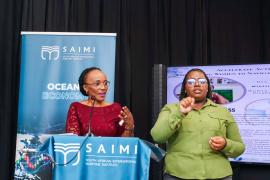
Women have been urged to take a leading role in shaping the future of South Africa’s maritime industry.
The Minister in the Presidency for Women, Youth and Persons with Disabilities, Sindisiwe Chikunga, said schools must encourage more girls to pursue Science, Technology, Engineering, and Mathematics (STEM) subjects, and for higher education institutions to intensify training in scarce and critical skills, such as the maritime sector.
“Institutions of higher learning, let us double the efforts and produce more skills and
technical expertise needed to drive the development and growth of the oceans economy at national, continental and international levels,” Chikunga said.The Minister was addressing the South African International Maritime Institute (SAIMI) stakeholder dialogue at the Nelson Mandela University, in the Eastern Cape, on Thursday.
Held under the theme: “Accelerating Action: Empowering Women to Navigate New Horizons”, the stakeholder dialogue focused on transformation and the empowerment of women in the maritime sector, empowering women through knowledge sharing, while providing a platform for networking and building supportive connections within the maritime sector.
Chikunga emphasised the need for greater synergy between institutions that support women, including access to funding, financial literacy programmes, and capacity-building initiatives for women-owned businesses.
“Our G20 priorities as the Empowerment of Women Working Group seek to facilitate that much needed synergy. Financial inclusion, care work both paid and unpaid, as well as prevention of gender-based violence, are at the pinnacle of our discussion in coordinating women in South Africa, Africa and the globe to speak with one voice.
“Financial inclusion must be a lived reality of all women in the maritime sector across all maritime industries,” she said.
Highlighting persistent inequalities, Chikunga noted that while women make up 44% of South Africa’s workforce, only 27% occupy managerial positions, according to the World Bank
“In the maritime industry, the disparity is even greater: women account for just 1% of active seafarers globally and less than 20% of the overall maritime workforce.
“Within the maritime sector, senior leadership in ports and shipping companies remains overwhelmingly male, and in many coastal communities, young girls still do not see themselves reflected in this industry.”
Chikunga stressed the untapped potential of South Africa’s ocean economy, noting that despite the country’s 3000km coastline, nine commercial ports, and an exclusive economic zone of 1.5 million km², the sector’s contribution to GDP remains underdeveloped.
She pointed to Operation Phakisa, the national “Blue Oceans Economy” strategy launched in 2014, as a key driver of growth, with the potential to contribute R177 billion to the GDP and create between 800 000 and one million direct jobs by 2030.
“The Blue Oceans Economy Strategy unveiled a plethora of maritime industries which others were dormant in South Africa. Operation Phakisa, the blue oceans economy strategy places women and youth as central to the sustainability of the sector,” Chikunga said.
With the help of the World Maritime University and state institutions such as the Transport Education and Training Agency (TETA) there is funding for students to take up maritime studies for different maritime professions, thus facilitating a capable competent workforce.
“The World Maritime University further assisted in the process of establishing Our Universities to have Maritime qualifications like the Nelson Mandela University in Port Elizabeth South Africa – hence we have the South African International Maritime Institute (SAIMI) today,” the Minister said. – SAnews.gov.za
No comments:
Post a Comment